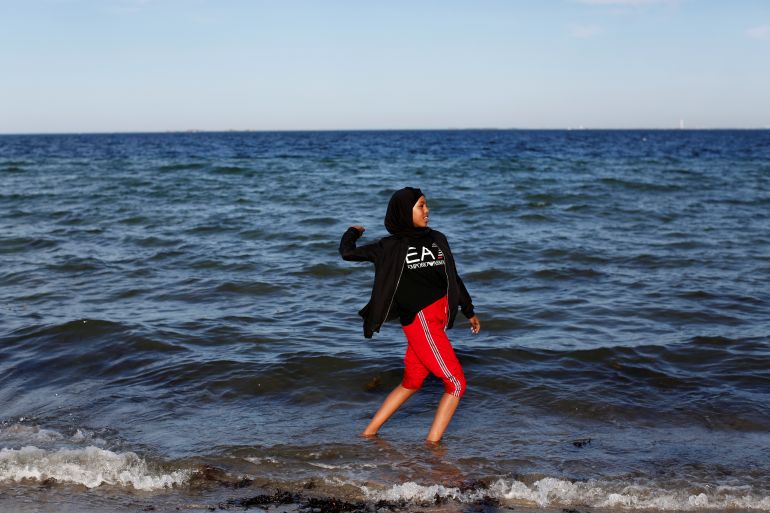Denmark: Plan to further limit ‘non-Western’ residents draws ire
The government has proposed further reducing the number of ‘non-Western’ residents in certain areas in a bid to eradicate what it calls ‘ghettos’.

When Ahmad Salamoun received an eviction notice at the home he has lived in for more than 30 years, in Helsingør, painful memories flooded back to him.
Salamoun arrived in the Danish city, known as the setting to Shakespeare’s Hamlet, in the eighties, having fled the civil war in Lebanon – where he had lived in a camp as a Palestinian refugee.
Keep reading
list of 4 itemsSyrian refugee quits bid for German parliament seat over racism
‘Not French enough’: What it means to be an immigrant in France
How the far right got a stranglehold on the West
“It’s the same feeling I have now,” he told Al Jazeera.
Reflecting on his experiences as a Palestinian under Israeli occupation, a refugee in a Lebanese camp, and an ethnic minority in Denmark, he added: “When you pick up people from one place and replace them with new ones, it is based on injustice and the colonial mindset.”
Salamoun is among the people affected by Denmark’s controversial “ghetto” laws which are, according to officials, aimed at integration.
Passed in 2018, the regulations are part of a national scheme – “One Denmark without Parallel Societies: No Ghettos in 2030″ – and under them, the number of “non-Westerners” in disadvantaged neighbourhoods is capped at 50 percent.
The government recently proposed reducing the limit to 30 percent within the next 10 years.
According to Interior Minister Kaare Dybvad Bek, too many non-Western foreigners in one area “increases the risk of an emergence of religious and cultural parallel societies”.
In a recent meeting hosted on Facebook, Bek said: “We need to get better at spreading cultures so that not all perpetrators of violence live together and reinforce the norms they have been accustomed to.”
Critics say the move risks minorities being evicted and further discriminated against.
On April 6, the parliament will debate the existing legislation after a petition by civil society calling for it to be repealed received 50,000 signatures.
“The issues arising from the legislation go to the heart of concepts often associated with Denmark across the world, including egalitarianism and strong social and economic systems for its citizens,” Susheela Math, a lawyer with the Open Society Justice Initiative, told Al Jazeera.
“But if that’s to be a reality, respect for fundamental rights, including equality must be restored.”
Various UN bodies have criticised the Danish government’s designation of “non-Western”.
In a statement last year, the UN Human Rights Office said: “Statistics Denmark, under the Danish Ministry for Economic and Interior Affairs, defines ‘non-Western’ as any country outside the EU, with the exceptions of Andorra, Australia, Canada, Iceland, Liechtenstein, Monaco, New Zealand, Norway, San Marino, Switzerland, the USA, and the Vatican State.
“The effect is that ‘non-Western’ disproportionately means Denmark’s non-white, non-European ethnic populations.”
Amani Hassani, sociologist and research coordinator at the Center for Danish Muslim Relations (CEDAR), told Al Jazeera: “It’s trying to make these places more white.
“The government wouldn’t talk about it in racial terms but it is a racialising policy.”
The “ghetto” designation applies to neighbourhoods where more than half the population is of “non-Western” origin, and which meet at least two of four criteria based on income, employment, education and crime rates.
The government compiles a list of “ghettos” each year. There are currently 15 such neighbourhoods.
“A housing estate that has 100 percent white residents, but still struggles with crime rates and unemployment rates and so on, will not be on the government’s radar,” said Hassani.
She noted that the laws also apply to people like herself – descendants of “non-Western” immigrants.
While the government has considered dropping its controversial “ghetto” label, Math says that the laws’ stigmatising effects will remain.
It is also feared that the expanded laws will further limit access to social housing.
“Public housing is supposed to be accessible to everyone in the country,” said Hassani. “[But this] really implements a structural discrimination of minorities and their housing opportunities in the market.”
Legal battles
Salamoun, with the help of organisations such as the Danish Institute for Human Rights, has launched a legal case over his eviction.
For now, he remains at the apartment he has called home for decades, but worries he could be forced to leave at any given time.
“I protested against this decision for my children,” he said, describing them as Danish, educated and well-integrated.
“I will never let them live in the same conditions I lived in during my days in Lebanon and other countries,” he says.
Math, meanwhile, is acting in a case by a group of residents facing eviction from a housing project called Mjølnerparken, in the capital of Copenhagen, against the Danish Ministry of Transport and Housing.
While the government has stated these laws are meant to encourage social integration, Math’s lawsuit, filed May last year, stipulates they violate principles of the EU’s Race Equality Directive and the European Convention on Human Rights.